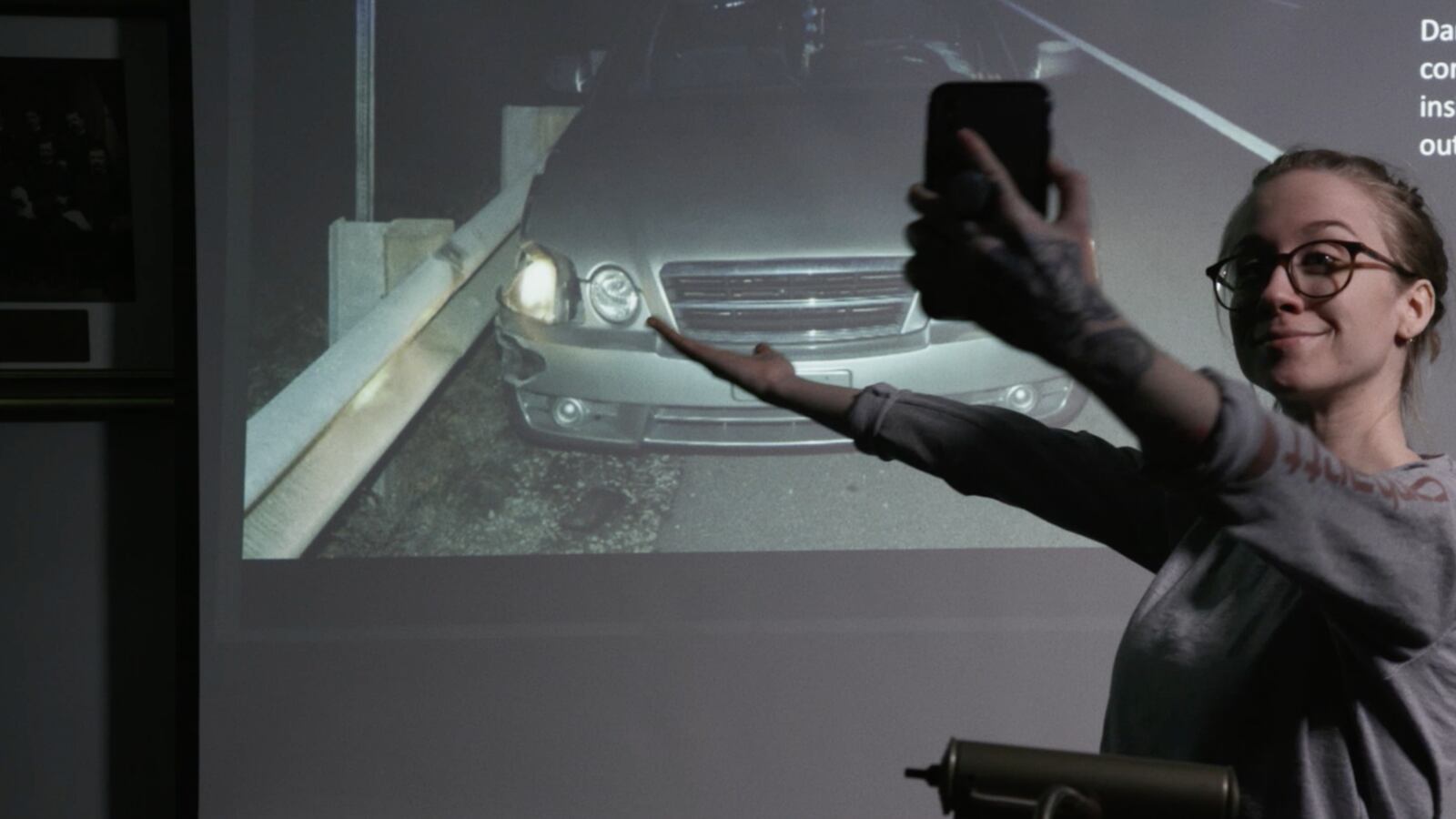The rise of the true crime genre is nothing new. Now, it just has shiny new packaging that only grazes its brutal underbelly. What used to be reserved for nightly news rubberneckers and Dateline loyalists has exploded into a legitimate phenomenon, as popular and ubiquitous as dramas or comedies. True crime transcends medium. We see it in documentaries, television series, and podcasts alike. And because people can never get enough of the macabre details, new entries into the canon pop up incessantly.
The drawbacks of true crime saturation are on gruesome display in Citizen Sleuth, a new documentary premiering out of SXSW. The film is a rare peek inside the life of an amateur true-crime podcaster, Emily Nestor, whose podcast, Mile Marker 181, examined the 2011 death of Jaleayah Davis, who was in a grisly car crash on the border of Emily’s home state of West Virginia. Despite being ruled as an accident, Jaleayah’s death remained local lore over the next decade, with her family suspecting some form of foul play.
(Disclosure: Allegra Frank, a Daily Beast’s Obsessed editor, is a member of the SXSW documentary jury. She was not involved in coverage of any documentaries or editing of the story.)
Invigorated by both her love of true-crime content and her interest in Jaleayah’s death, Emily starts up her podcast and turns her home into a mini recording studio, complete with the grim details of the night of Jaleayah’s death pinned to her walls. Though its title is a parodic play on the 1996 film Citizen Ruth, it can be taken literally. Citizen Sleuth documents Emily’s search for answers firsthand, taking it upon herself to recreate even the most minutiae accident details and speak to law enforcement involved with investigating the accident.

What unfolds is a gripping and darkly funny tale of what can happen when novice investigators insert themselves into closed cases for the sake of creating content. As Emily tries to walk the thin line between exploitation and entertainment, her motivations come under question, as she learns more about the case than she ever expected. The resulting chaos serves as a cautionary tale to both true-crime podcasters and their loyalists, unlike anything the genre has seen yet.
Citizen Sleuth begins in the same vein as any of your favorite true-crime documentaries. Director Chris Kasick presents the players and lays out the details of Jaleayah’s death in their horrific detail. After a night out with her friends went south, Jaleayah was found past a highway mile marker, her clothes landing neatly atop the guard rail. Jaleayah’s friends returned home that night safe and sound, only hearing about her death the next day.
In the years since her death was ruled an accident, suspicions arose that—if there were to have been foul play involved—Jaleayah’s friend group might have escaped culpability due to their familial ties with the local sheriff’s office. Each detail is presented to viewers in the same way they might be in a nightly newsmagazine, carefully planted at specific points to arouse the same doubt in audiences that was brewing in Emily when she began her podcast.
The more we learn about the late Jaleayah, the more we get to know Emily. Born and raised in West Virginia, she felt like an outcast her entire life. She was obsessed with Silence of the Lambs from a young age, fancying herself a proto-Clarice Starling, who shared her West Virginian roots. It soon becomes clear that, despite a genuine interest in Jaleayah’s case, Emily is equally desperate for a connection to something bigger, outside of her rural upbringing. She wants to be more, become more, and become known for more. “I think I’m chronically misunderstood,” she says to the camera at one point, detailing her frustrations with other people’s perceptions of her motives.
At several points, Citizen Sleuth has more in common with a Christopher Guest mockumentary than it does true-crime documentaries—and that’s to director Kasick’s credit. Cameras follow Emily to a tattoo parlor one night, where she gets inked with a dagger-stabbed heart that says “TRUE CRIME.” She’s also welcomed as a guest to CrimeCon, an annual gathering of the biggest personalities in the true crime sphere. As she lays on the chair in the tattoo parlor and skulks around CrimeCon, giving her business card to Nancy Grace, it’s impossible not to wonder why the hell someone might take this person with no training seriously.

But Emily prides herself on her rookie status, thinking it makes her a better detective. “People don’t take it seriously because I’m working for myself—I’m not working for a paper…or a news source,” she tells the cameras after local police kick her out of the station for trying to question them into a corner. “I don’t belong with journalists and I don’t belong with law enforcement, and I feel like I’m floating somewhere in between.”
What quickly becomes evident is that Citizen Sleuth is not trying to document an amateur podcaster’s noble fight for justice, but warn against the potential perils of the genre as a whole. Emily knows that true-crime podcasts have a history of changing the outcome of closed cases, catching murderers decades later and exonerating innocent people. She sees “Mile Marker 181” as her ticket to something bigger than herself. Ironically, the podcast does grow into something more powerful than she’s able to handle. And when Emily starts to consult professionals halfway through the film, her podcast spirals out of control.
As Emily loses the reins, Citizen Sleuth retains a sharply critical lens on both its subject and the genre it’s interrogating. The morality and ethics behind true crime—and specifically true-crime podcasts—have never been quite so astutely examined. The drawbacks to turning a hobby into a job, while other people’s real lives and reputations hang in the balance, are probed with both consideration and the audience’s entertainment in mind.
Nearly two years and 23 episodes into “Mile Marker 181,” Emily removed the podcast from streaming services, dropping one final blow to the loyal fans responsible for her millions of downloads beforehand. Citizen Sleuth is an exceptional look at every neurotic bit of disarray up until that moment, one that considers the major implications of what can happen when podcasters get too high on their own supply. Imitation might be the sincerest form of flattery, but it’s what ultimately lands Emily pressed against a wall of her own making, trying to find a way out from her own well-intentioned naivete.







